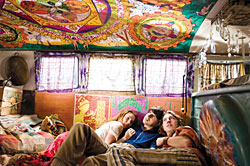 |
You'd be forgiven if you approached Taking Woodstock with some trepidation. Ang Lee, perhaps unfairly, has had in recent times a chequered record with critics and audiences. It's just a few seconds into the credits and you are already put in mind of his previous films - that score reminiscent of Brokeback Mountain, and those panels within the screen that scream Hulk. But you are treated to his lush images, his affecting composition and his knack for seemingly effortless cinematic characterisation, and there's a stirring of recognition of his genius. Could this be an overlooked masterpiece?
What to make of Woodstock, the now-legendary hippie event that drew half a million to partake of peace, love, music and...what exactly? The counter-culturel movement of the 1960s was extraordinarily influential, and resonates still in the critiques of KFC openings in places such as Kathmandu as well as the growing popularity of the slow food movement in the press. When we feel trussed by the global economy and its consumerist lifestyle, we continue to look to what the hippies represented. But it appears America and to an extent the rest of us remain ambivalent to the counter-culturel movement, even if capitalism has not quite delivered. Think of the hippies, and some of us feel embarassment, if not outright hostility. Lee's approach to this subject takes on a certain quality of naivete, with the admiring, even longing, gaze of an outsider.
Taking Woodstock is based on a memoir, and has for its protagonist Elliot, a young man who returns from New York City to help his folks run their rundown motel in a rural community. When he invites the Woodstock organisers down to his place after they are driven out of the festival's proposed location in a neighbouring town, Elliot becomes suddenly and accidentally instrumental in bringing in Woodstock and hundreds of thousands of hippies. The burgeoning madness of the festival elicits meek and harried panic followed by mild fascination. We, like Lee's protagonist, are along for the ride. Like docile tourists, we sample a little of the wild side - even Elliot's acid trip is a placid, if interesting, exercise in filmic montage (though it concludes with a gorgeous orgiastic climax of undulating masses on a hill to the soundtrack of a sitar). Sure, it may not be the 'genuine' Woodstock, but it's a pleasant trip all the same.
Lee populates Taking Woodstock with a brace of actors whose talents elevate their thinly written parts - Live Schreiber as the crossdressing ex-marine who provides security at the motel, and Imelda Staunton as Elliot's mother, for instance. Granted there are problems, especially the inexplicably wooden performances in some parts of the film with characters that go nowhere. But even lulled by the cosy warmth and endearing helplessness of its lead, one would have to be pretty set on disliking the film to miss the thoughtfulness that Ang Lee and his screenwriting partner James Schamus have infused into this product. It has themes that are ostensibly counterintuitive against the backdrop of Woodstock, and that is precisely both its crime and its genius - taking this bacchanalian explosion, the iconic event of the counter-culture movement, and making it a mere backdrop to a young man's story of being torn between his desire to break free and the responsibility he feels towards his family. Of course, that tussle between repression and freedom is par for the course in an Ang Lee movie, but this entry might well belong in the upper echelons of his fascinating oeuvre.
Taking Woodstock
Directed by: Ang Lee
Cast: Demetri Martin, Dan Fogler, Henry Goodman, Jonathan Groff
121 min. R



